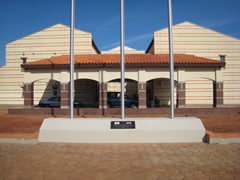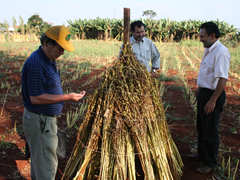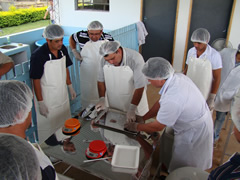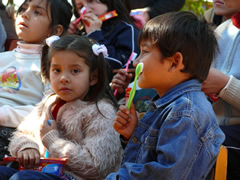Principal Schemes of Cooperation
Technical Cooperation
Technical cooperation is one of the main activities of the JICA overseas. This cooperation scheme is to leverage the knowledge, experience and ability of the host country and Japan to meet a specific need within a given period.
A technical cooperation project includes the dispatch of Japanese experts for technical assistance, the training programs for counterparts or partners in Japan and other third-countries, and the provision of equipment for the project.
Official Development Assistance Loans
This scheme is a long-term financial loan with relatively low interest rates compared to the market rate. These loans are principally used to improve social infrastructure which contribute to the economic and social development of the country.
Currently, there are two projects under this scheme in Paraguay:
- "Rural Road Improvement" (PG-P16)
- "Eastern Region Export Corridor Improvement Project" (PG-P17)
Grant Aid
Grant Aid refers to the financial cooperation implemented by the Japanese government with no obligation for repayment by the developing country concerned. Targeted mainly at developing countries with low income levels, this type of aid covers a wide range of cooperation related to the future of developing countries, including development of social and economic infrastructure, such as the construction of hospitals or bridges, as well as education, HIV/AIDS awareness, children's health, environment and other areas.
Acceptance of technical training participants
JICA's Training and Dialogue Programs are a form of technical cooperation that JICA carries out in Japan. Some of the knowledge that Japanese society has accumulated, including its background in areas such as organizational know-how and social systems, can only be understood through first-hand experience. The programs are an important means of technical cooperation which supports human resources development and resolving issues in developing countries.
Volunteer Program
JICA's volunteer programs support activities by Japanese citizens who wish to cooperate in the economic and social development as well as the reconstruction of developing countries. Through these cooperation activities, participating volunteers can not only contribute to the development of partner countries but also gain valuable experience in terms of international goodwill, mutual understanding and an expansion in their international perspectives.
Other Schemes of Cooperation
Follow-up Cooperation
Cooperation projects conducted by JICA are completed after a predetermined period of time. JICA carries out ongoing monitoring after a project has ended to assess the partner country's self-help efforts in maintaining and enhancing the results of the project. JICA also provides indirect and supplementary support when necessary. Such support is referred to as "Follow-up Cooperation," which may be broadly divided into two categories.
- Follow-up Cooperation to Solve Problems with Facilities and Equipment
- Follow-up Cooperation to Expand Project Benefits
Public-Private Partnerships
This scheme of cooperation of JICA is implemented through PPP (Public-Private Partnership) in which government and private sector share responsibilities. Japanese private sector possess technological and human resources in various fields that may assist in fulfilling societal needs and have a positive impact on the social welfare of the partner countries.
JICA Partnership Program (JPP) - Japan Desk
JPP is a technical cooperation program implemented by JICA through "Partners in Japan", such as NGOs, universities, local governments, and public corporations with intentions to cooperate abroad, submit project proposals to JICA, which are executed together with a host country NGOs.
Science and Technology Research Partnership for Sustainable Development (SATREPS)
This program is designed to promote international joint research in which both Japanese research institutions and those of recipient countries work together based upon the social needs in recipient countries. Its aims are to obtain new knowledge and to utilize research outcomes to the benefit of the society with a view to resolving global issues such as the environment and energy, biological resources, disaster prevention, and infectious diseases. In conjunction with this, it also aspires to improve the development of human resources and research capabilities in recipient countries by conducting joint research.
Emergency Disaster Relief
JICA's Disaster Relief Program dispatches Japan Disaster Relief (JDR) teams and provides emergency relief supplies when major disasters occur, mainly in developing areas, in response to requests received from the governments of affected countries or international agencies.
Support to Nikkei communities
The Government of Japan, through JICA, assists and supports Nikkei community through training scholarships, sending volunteers and subsidies to organizations.









scroll